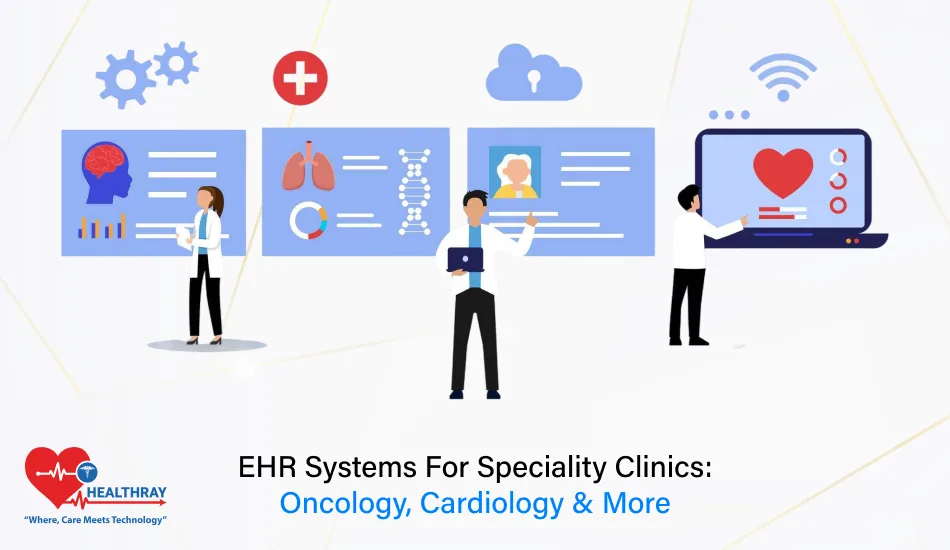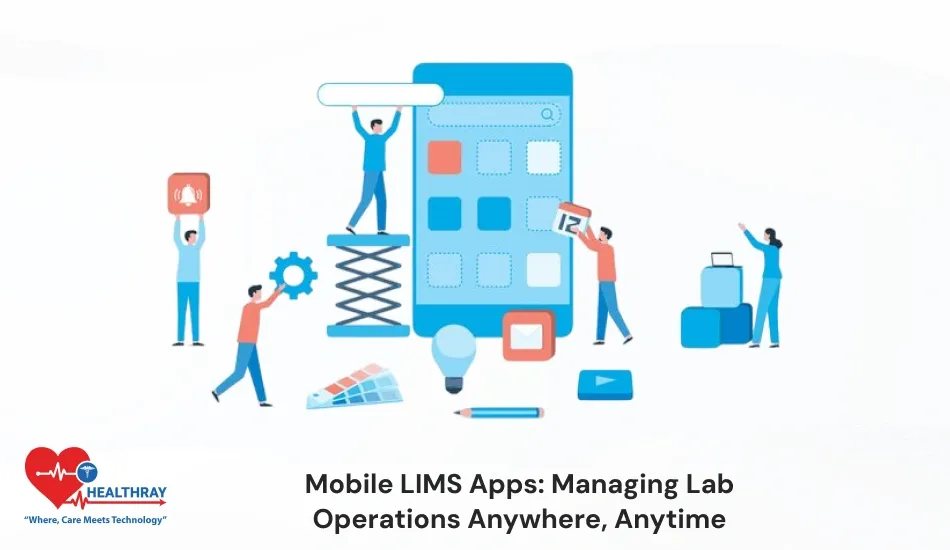Summary
Healthcare is changing fast, and technology is, as usual, at the cutting edge. EHR for Speciality Clinics is changing the practice of medicine, the process of healing and the movement of data.
These systems don’t just maintain records; they think, predict, and help simplify care. From finding invisible trends to alleviating physician burnout, they make better clinics and happier patients. As medicine becomes more digital, the real power is in making each treatment more human and connected using innovation.
Introduction
When you go to a restaurant with many menu options, you want a chef who knows how you like your dish, not someone guessing it for the first time. Just as you wish your chef knew what you wanted, every patient who walks into your speciality clinic aspires to the care that is personal, accurate, and immediate.
And that’s exactly what EHR for Speciality Clinics offer!
These newer EHR systems assist physicians and nurses in organising complicated patient records, monitoring treatments, keeping track of orders, and communicating easily with others in the care team. Even better, mobile EHR access enables specialists to review patient histories, revise treatment plans, and speak with patients or team members in real time, anywhere and at any time. This means faster decision-making by doctors, better patient care, and more efficient clinics.
In this post, you will learn exactly what EHR Software for Speciality Clinics is, how it works and how it changes the way speciality clinics care for patients every day.
What is EHR for Speciality Clinics?
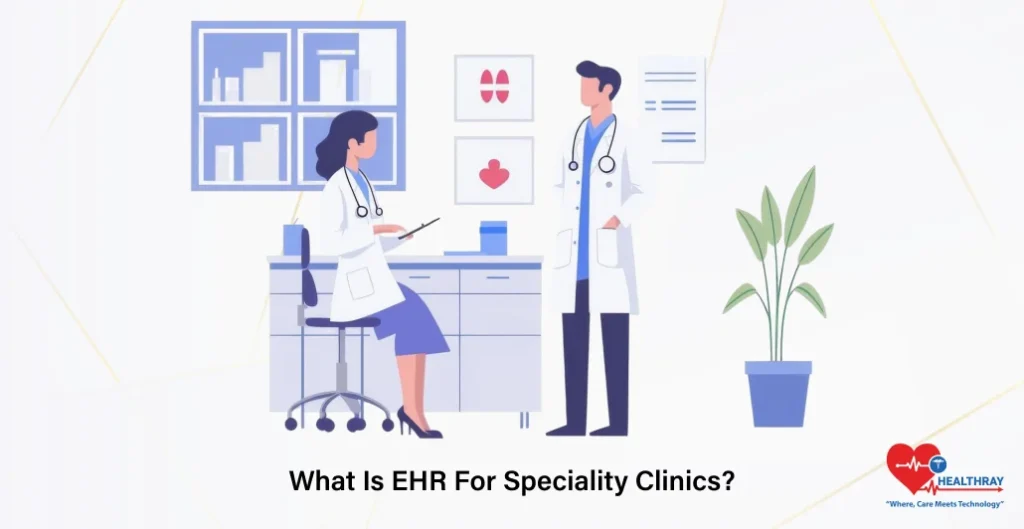
EHR for Speciality Clinics is an electronic health record that enables physicians and staff to manage patient records easily and accurately. Unlike physical files, EHR software compiles and keeps everything in a single, secure location, including medical histories, lab reports, prescriptions and treatment plans.
General EHR programs are good for general clinics, but speciality clinics require some speciality tools. Most systems note rudimentary patient information such as name, age, diagnosis, and prescriptions, but EHR for Speciality Clinics goes much deeper. It includes templates, charts and workflows for specific diseases and fields such as oncology, cardiology and neurology.
For example, an oncologist can track chemotherapy cycles or tumour stages, and a cardiologist can track ECGs or blood pressure over time. A more generic system can’t work with that granularity.
They also provide mobile EHR access, allowing doctors to access patient updates, lab reports, or test images on the go. Some use AI to anticipate risks, recommend care plans, and flag abnormalities to physicians.
So, while general electronic health record systems capture data, speciality EHR systems make data smart. They accelerate processes, lower mistakes, and promote greater interdepartmental collaboration.
Key Benefits of EHR for Speciality Clinics
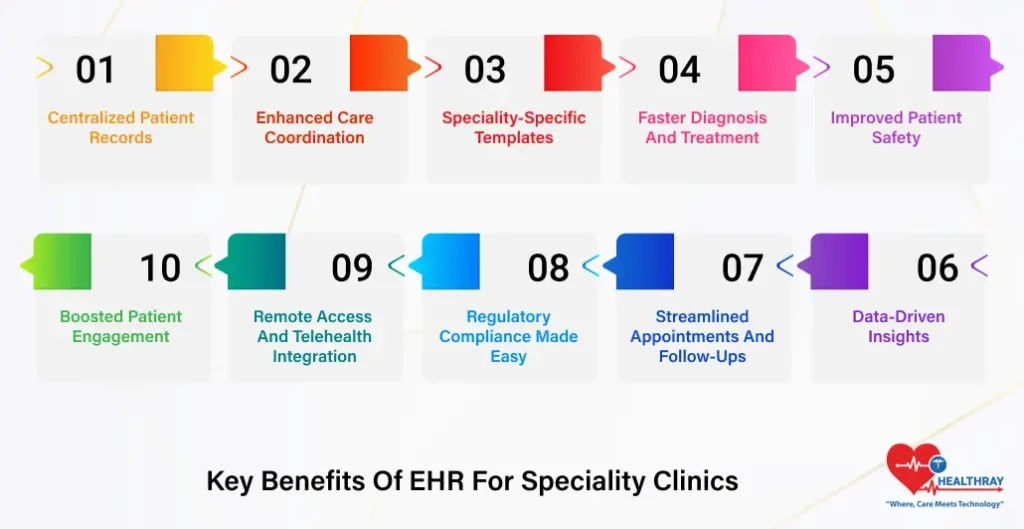
Discover how the EHR for Speciality Clinics is changing the way doctors work and patients care for the better. These benefits are far beyond going paperless; they make daily clinic life easier, quicker and more connected.
Centralized Patient Records
Every clinic has documents that they deal with daily. But with modern EHR software, all patient data, from lab results to medical histories, lives in one safe, searchable place. Gone are the days of flipping through stacks of reports and calling departments for information. A click pops it all up.
Charts, prescriptions, and notes are all available on those mobile EHRs; doctors and nurses can access them at a conference, say. It’s like having the whole medical file in your pocket. This consolidated access not only saves time, but is a major contributor to enhancing patient care as decisions can be made faster and more accurately.
Enhanced Care Coordination
Speciality clinics often put multiple experts: oncologists, cardiologists, radiologists and more working on the same patient. Communication gaps can emerge without strong coordination. This is where EHR for Speciality Clinics really excels.
Care teams can update one another instantly through connected dashboards. Everyone has visibility into the latest treatment notes, lab results, and medication changes. AI-powered EHR software also alerts users when another provider has failed to update a record or when duplications occur, helping reduce confusion and errors. This kind of integrated communication reduces test duplication and increases confidence in treatment plans.
Specialists can also stay connected on the go with a mobile EHR Software Systems access feature. Whether at another hospital or working from home, they can contribute insights, answer questions and remain entirely in sync, again helping to improve patient care with teamwork and real-time information.
Speciality-Specific Templates
Each speciality has its own particular way of recording data. Oncologists are concerned with tumour size, chemotherapy schedules, and follow-up cycles. While cardiologists monitor EKGs, heart rates and cholesterol levels. Therefore, generic templates don’t work for them.
This is why EHR for Speciality Clinics has templates for each field. Doctors can fill in the information that is important to them, without scrolling through fields that are irrelevant. AI-powered EHR software applications can also detect how a provider uses the record and will highlight the most relevant portions.
It saves precious minutes in each consult and relieves staff stress. And it aligns with doctors’ preferences, so each patient visit is easier than the last. And when the mobile EHR access feature is added, then these templates can be updated on the go by specialists, even between appointments. This personalized efficiency means more time with patients – enhancing patient care in every step.
Faster Diagnosis and Treatment
Speed is of the essence, particularly in fields like cardiology and oncology, where acting fast can save lives. Record-keeping is a time-consuming process, but with EHR software, this becomes a benefit.
Having all that information at their fingertips, with access to entire histories and the ability to look at results and treatment progress side by side, doctors can be fast and sure. Some AI-powered EHR software can even analyze patterns and run possible diagnoses or treatment options based on data trends.
Doctors can check lab results on the go, refill prescriptions from afar, even text with patients in real time. Diagnosis and treatment can occur more quickly, more seamlessly and more accurately, again enhancing patient care with speed and precision.
Improved Patient Safety
Errors in medication, allergies, or test duplication can be dangerous. EHR software minimises human error because it always has a patient’s information up to date and readily available.
EHR software also adds another safety net. It can alert users to possible drug interactions and dosage errors or to test results that are missing. These gentle nudges are like having a digital assistant hovering over every step.
And with mobile EHR access, doctors no longer need to be sitting at their desks in order to verify something before they sign off on a treatment or prescription. Not only does this validate patients, but it also instils confidence, thus enhancing patient care.
Step towards digital era with our healthcare solution
Revamp your hospital facilities and embrace change for better healthcare management. Ease in managing and organizing large medical datasets leads to effective analysis. Seize the opportunity now!
Data-Driven Insights
Data has power, but only when harnessed and used effectively. EHR for Speciality Clinics makes raw data useful. Clinics can see trends among patients, understand their recovery and estimate future volume.
These reports are deeper with AI-powered EHR software. The system identifies those underlying patterns, as well as potential health risks, and highlights treatment efficacy. This facilitates better decision-making and care plans at the clinics.
With insights at their fingertips, specialists can work more quickly and intelligently. This application of analytics also has an important effect on patient care as it requires treatments to be both preventative and personalised.
Streamlined Appointments and Follow-Ups
The scheduling chaos that ensues is one of the biggest headaches in any clinic. Missed appointments or late follow-ups can disrupt care and cause frustration. Electronic health record systems make scheduling easier than ever.
Patients are automatically reminded about their future appointments, and doctors are notified instantly when patients cancel or postpone appointments. AI-powered EHR software can even begin to predict busy times and schedule patterns to avoid wait times.
And with mobile EHR access, doctors and staff can reschedule or confirm appointments on the fly, even after hours. The result? Happier patients, calmer staff and a smoother workflow overall.
Regulatory Compliance Made Easy
Healthcare regulations are complex, but must be adhered to. Keeping track of all those records and reports is exhausting by hand. That’s where EHR for Speciality Clinics comes in.
All records are securely stored, with every entry time-stamped, and important capture data is automatically recorded by the EHR software. It also produces reports that are acceptable for healthcare standards without all the paperwork.
Adding an AI-powered EHR software makes compliance even simpler. It also reminds teams about document deadline dates, signature misses, and incomplete forms.
This type of reliability not only helps avoid fines or legal complications, but also allows clinics to concentrate on what they are supposed to be doing, enhancing patient care, not chasing paper.
Remote Access and Telehealth Integration
Healthcare is going digital, and mobile EHR access is part of this transition. Providers can remotely consult with patients, see their records in real time, and adjust treatment plans over telehealth appointments.
Video platforms are also easily compatible with EHR software and allow for real-time data sharing. Imagine a cardiologist checking the heart rate of a patient miles away, or an oncologist discussing chemo side effects via a virtual visit. All of this is done within one safe system.
Meanwhile, AI-powered EHR software is helping physicians keep track of these interactions and summarizing chief notes, and aiding continuity between tele and in-person visits. This digital flexibility saves travel time, improves consistency and makes care available to patients who cannot regularly visit the clinic.
Boosted Patient Engagement
Patients who feel involved heal faster and remain loyal to their clinic. Electronic health record systems empower patients to manage their own health. They can log in and see their reports, check lists of medication, and message their doctor securely.
This engagement is continuous with mobile EHR access. Patients can report symptoms, request refills or confirm appointments with a few taps.
A patient who is this involved changes the way you understand the patient experience. They stop being passive recipients of care and become active partners. And when patients and providers collaborate, it’s the best recipe for enhancing patient care.
The Future of EHR for Speciality Clinics
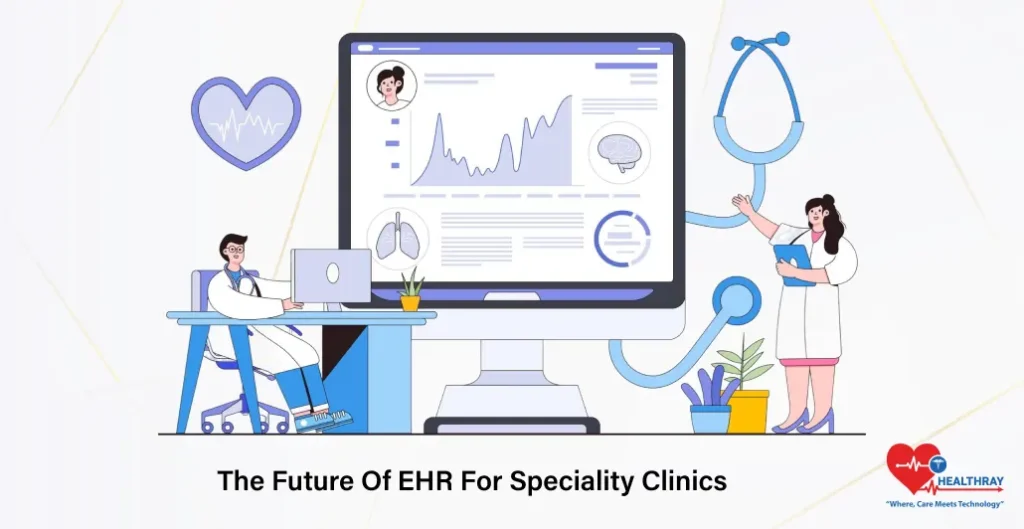
The future of EHR for Speciality Clinics is as smart, fast and connected as ever. AI-powered EHR software can help clinics anticipate their patients’ needs before issues become serious. Doctors use artificial intelligence to spot health risks and recommend better treatments, and to save time. Care decisions will be supported by predictive analytics to transform patient data into actionable insights to enhance precision and speed.
Telemedicine will continue to expand, too. With EHR access from their mobile devices, specialists can see patients anywhere, even at home, or in different cities or countries. Simultaneous record, scan and test results sharing will enable smooth and trustworthy virtual treatment.
The future will see EHR programs talking to wearable devices so that physicians can monitor the health of patients 24/7. This means faster reactions, safer care and more personal attention. The goal remains the same: improving patient care through technology that makes healthcare smarter, simpler, and more human.
Conclusion
In the rapidly evolving landscape of care technology is the lifeblood of improved treatment. EHR for Speciality Clinics unites the doctor, the patient and the data in one intelligent room. It is a time saver, it reduces mistakes, and it makes every visit more personal.
To help in everything from decision-making to teamwork, it turns challenges into clicks. With the right approach, digital care is not just possible but is the future of connected, compassionate, and truly efficient health care.
